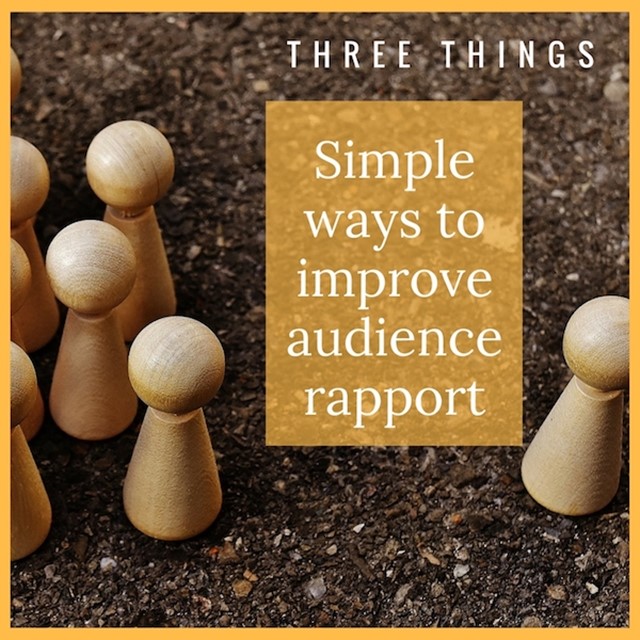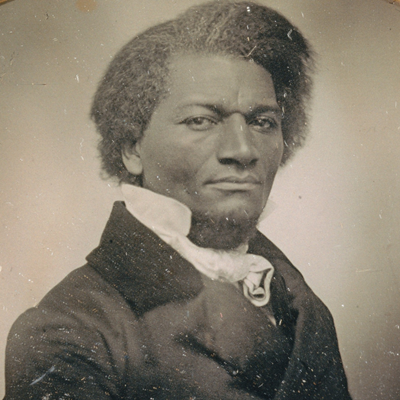
"I worry that I seem arrogant."
"Don’t feel I connect with audiences the way I’d like to."
"Tend to antagonize people."
These are frequent self-assessments we receive in the pre-course questionnaire we send to The Buckley School’s Executive Seminar students.
In feedback during that course, we always address rapport.
A skeptical student might say: “Oh, goody. They really really like me. Why do I care?”
Why Rapport Matters
We all know that when we connect with a speaker, we're more receptive to what that the speaker has to say.
When an audience is put off by a speaker, the speaker faces another hurdle to getting his message across.
Rapport matters, because it helps you further your message. Rapport is built when you can put the message ahead of yourself.
3 Simple Ways to Improve Rapport
There are dozens of ways to fine-tune your delivery to create greater audience rapport. Here are three simple ones that can help the next time you speak:
1. Try using “we” instead of “you.”
This is a simple shift we advocate all the time. For example, instead of saying in a business presentation “you should get behind cost cutting,” try making it “we.”
What happens when you we do that? It puts us on a level with our audience. The speaker isn't preaching to. She's speaking with.
Of course, you cannot say “we” when you specifically mean “you,” as in “you no longer have a job with our company.”
But often, we can say “we,” and with that simple change, align ourselves with the audience and remove the impression of being superior.
2. Make your enthusiasm obvious.
Cool. In control. Professional. This is how most businesspeople we coach would like to be described, of course.
These qualities, though, can make a speaker seem detached. Not excited or committed to the cause. Too casual about the audience and the effort they’re making to stay awake through his presentation.
Dialing up the energy is a way to signal your eagerness to connect with them: You are willing to work to win their support. It’s a compliment to the audience. Who doesn’t like compliments?
Please note: We are not saying you should speak in a style that is wildly beyond what seems natural to you. Nor are we recommending that you speak in high-octane mode the entire time. But consider throwing yourself into the message a bit more, where and when appropriate. Work for the audience, without so much concern about your cool factor.
3. Tell a story about yourself in which you’re not perfect.
Stories (and humor) can be great additions to presentations—because they bring concrete details to the message and some entertainment value, too.
If you have a self-deprecating personal story that makes a point, it can be a wonderful rapport-builder.
Imagine your message is this:
A speaker should strive to put the final consonants on words, so that she will be easily understood.
You could tell a story about how you’ve learned to do this so well and how it’s earned you fame and riches.
Or….
You could tell a story like the one our faculty member Jenny Maxwell tells about herself:
In a speaking exercise at The Buckley School, I gave an impromptu talk on the evils of shrink wrap. You know, the plastic stuff—full of static electricity, makes it impossible to return things once you’ve removed it.
Everyone was laughing, and I thought it was going so well. After I finished, I looked at Reid for some feedback. He said: “Darling, you were hilarious. I had no idea shrimp crap was such a problem. It’s so small.”
Which type of story is more likely to avoid the impression of arrogance and create audience rapport?
Rapport and Vulnerability
We tell Buckley students that the key to successful public speaking is to speak in service to your message.
But we also see the potential for another much-discussed idea at work here when it comes to rapport-building: being vulnerable as a way to connect.
University of Houston professor Brene Brown has a lot to say about vulnerability and connection. You'll see in this TED Talk that she uses (quite a few) self-deprecating stories to make her points:






